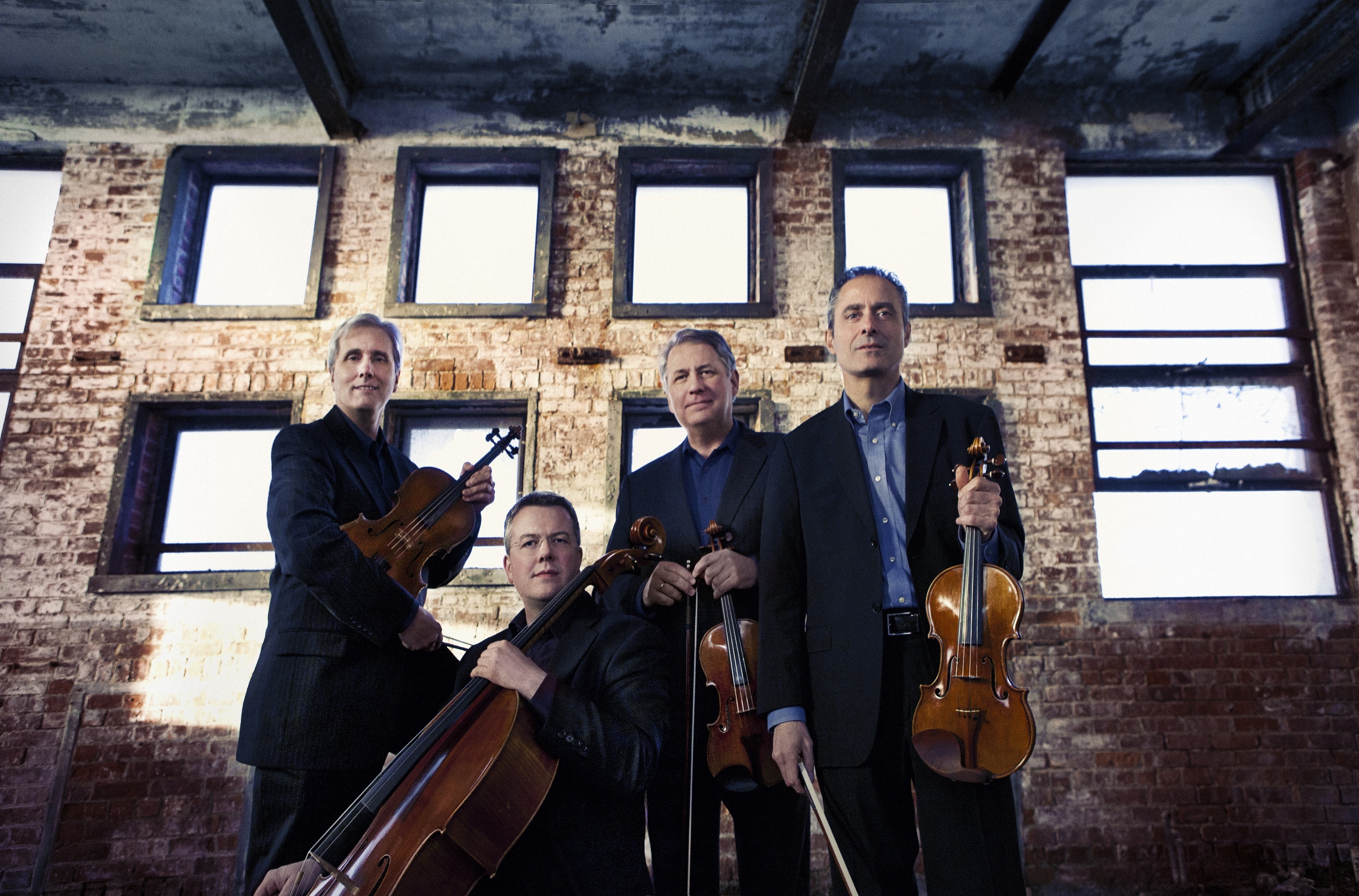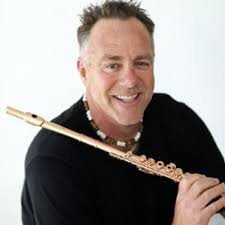La Jolla Music Society Presents the Emerson Quartet
It Was The Best of Concerts, It Was The Worst of Concerts . . .
The Emerson String Quartet again proved that it is perhaps the finest group of its kind. Their concert on Saturday, April 22, at La Jolla Presbyterian Church under the aegis of La Jolla Music Society was packed with every sort of person imaginable, all there for what promised to be a memorable chamber music experience.
And it was, indeed, an epic experience, on the one hand. Four established and gifted older white guys playing music by three other dead white guys who are generally considered to be geniuses: this should make for a marvelous concert. And it was. But it left this critic strangely unmoved and perplexed trying understand why. By the evening’s end, some conclusions were reached that were a bit surprising, if not challenging.

Emerson String Quartet (Photo credit: Lisa-Marie Mazzucco, used by permission La Jolla Music Society)
The opening Mozart String Quartet in D Minor, K. 421, from 1783 should have been revelatory. The work forms part of a canon of six quartets dedicated to Joseph Haydn, whose own Op. 33 opened new vistas in the medium for the younger composer. Upon hearing Mozart’s six quartets at Mozart’s home a second time, Haydn is known to have famously told papa Leopold, “Before God, and as an honest man, I tell you that your son is the greatest composer known to me either in person or by name. He has taste, and, what is more, the most profound knowledge of composition.” Well alrighty then: we should have been in for a masterful performance of a masterpiece. Mozart’s Six Quartets dedicated to Haydn are among his very finest, most well-thought out works and composed on the highest conceivable level of artistry.
Expectations being so high, the feeling that these fine musicians were “faxing this one in” was unavoidable. Intonation was perfect, everything was in place, rhythm was outstanding and yet, the final outcome came out quotidian. Understand, there was nothing wrong with the performance, it just didn’t do anything. No chances were taken, nothing was out of place, tempos were appropriate, decorum was in order, everything was just plain nice.
And in the final analysis, when one is talking about music making on this level, nice just doesn’t cut it. Mind you, this representation was close to perfect. The quartet trades off first violin duties between Eugene Drucker and Philip Setzer, who both play great, Cremona-era violins and who both studied with, among others, Oscar Shumsky at Juilliard. Consequently, there are great similarities in their playing: in fact, the entire group seems to have a relatively similar approach to sound production, and aesthetically all seem to be cut from the same bolt of cloth. Lest we forget in my sacrilegious criticism of these giants – and they are – that, as their website reminds us, “The Emerson String Quartet has amassed an unparalleled list of achievements over four decades: more than thirty acclaimed recordings, nine Grammys® (including two for Best Classical Album), three Gramophone Awards, the Avery Fisher Prize, Musical America’s “Ensemble of the Year” and collaborations with many of the greatest artists of our time.” With such an awesome resume, these criticisms must be taken in the context of how very, very great this band is.
Drucker, who played first for the Mozart and Shostakovich has a lean and compact sound, and despite the unknowable difficulties of playing Mozart, neither he nor anyone else ever broke a sweat. I wished for more: for these musicians who are at the top of their game to strive for new and higher levels of perfection and insight.
George Bernard Shaw wrote the 19-year-old Heifetz the day after his successful London debut, “If you provoke a jealous God by playing with such superhuman perfection, you will die young. I earnestly advise you to play something badly every night before going to bed, instead of saying your prayers. No mortal should presume to play so faultlessly.” Although clearly written in jest, there is a kernel of wisdom that pertains for the Emerson Quartet. Would that they would take some chances and fail every once in a while: if they did, their playing would be infinitely more interesting. As Heifetz himself once said, “There is no top. There are always farther heights to reach.” It would be refreshing if the Emerson reached a little farther than they apparently do.
The second essay on the program, Shostakovich’s String Quartet No. 4 in D Major, Op. 83, dating from 1949 is a study in gray. The “problem” with the Fourth Quartet, not unlike the “problem” with the Emerson Quartet, doesn’t lie in its structure or length or in anything technical: the problem is in its content. After writing his Third Quartet, Shostakovich, along with Prokofiev, Khachaturian, Myaskovsky and other leading Soviet composers were officially excoriated for their “formalistic distortions and anti-democratic tendencies” by the Stalinist authorities. The result was a virtual ban on performances of their music and, in Shostakovich’s case, the cancellation of his teaching posts at both the Moscow and Leningrad Conservatories. Shostakovich’s finances became dire, and he frantically pursued commissions, writing film music to help demonstrate his commitment to Socialist Realism. His first attempt on the road to “redemption” resulted in a shlocky seven-movement oratorio entitled “The Song of the Forests” (Op. 81) that resulted in his winning the Stalin Prize – First Grade.
After experimenting with using Jewish themes and scales, he decided to utilize them in his Fourth Quartet, since temporary winds of philo-Semitism were blowing. Not surprisingly, Stalin soon went on a paranoid anti-Semitic rampage, rendering Shostakovich’s musical material suspect in his handlers’ depraved minds. After two private performances by the Beethoven Quartet (who premiered thirteen of Shostakovich’s fifteen quartets) for the head of the Committee for Artistic Affairs, Alexander Kholodilin in 1949, it became acutely evident that Stalin’s late-stage anti-Semitic antics would cause the composer a lot of problems, so the piece was shelved until Stalin died, finally receiving its premiered in 1953.
The music (and, the Quartet) is remarkable for its restraint. All four movements are at a moderate tempo, emotionally reserved with no dramatic explosions to be found. The piece has a disturbed air about it – one might say, “repressed.” Perhaps it was a perfect foil for this group. The performance, as with the entire program, was nearly perfect and almost beyond criticism, except for wanting more.
In many ways, the post-Intermission hand-off between first violinists putting Setzer in the first chair entirely changed the esthetic of the group. Antonin Dvořák’s String Quartet in C Major, Op. 61, is one of his many masterworks. As with most of his successful compositions, the richly developed motivic writing is both a joy for the audience to listen to and for string players to perform. The Quartet greeted this work like an old friend and seemed to relish the sheer beauty of the work. Their playing, as it had been all evening, was ravishing in every respect. Special mention should go to their fine violist, Lawrence Dutton. His enormous and luscious sound was perfectly suited in his strong union with cellist Paul Watkins. Watkins, the relative newcomer to the band, joined in 2013, Quartet’s 37th season! As with all of the players, the low strings eschew pressing and the sound blossoms.
Although still avoiding any potential risk taking, the performance of the Dvořák was in many ways the most satisfying of the evening. Tempos were appropriate, there were no perceivable note errors and intonation was spot on. Everything was just as it should have been. It was very nice. And it lacked for that fact . . .

Yochanan Sebastian Winston, Ph.D. has performed throughout the United States, Europe and Latin America. His repertoire spans classical, jazz, klezmer, new age, contemporary, rock & roll and pop and is very active as a composer. Dr. Winston holds a Ph.D. from the UCSD, a Diplôme from the Conservatoire National de Region de Boulogne-Billancourt (France), and a Master’s and Bachelor’s of Music from the Manhattan School of Music in New York City.

“…there was nothing wrong with the performance, it just didn’t do anything.” This sounds very familiar for lots of concerts I am attending. Not really sure whether it is in my case the result of a somewhat long exposure creating higher expectations or if the musicians are indeed phoning it in often. How did the rest of the audience react to this concert ?
It went over very well.